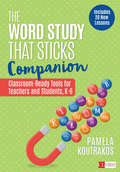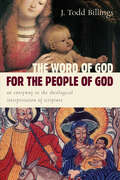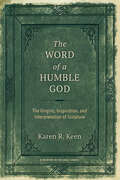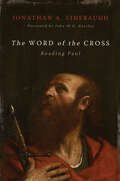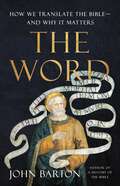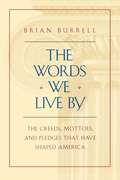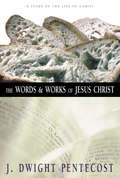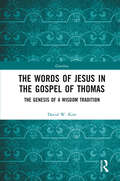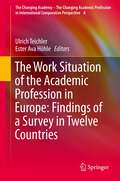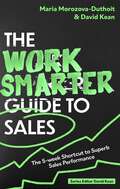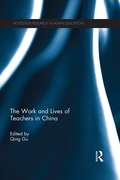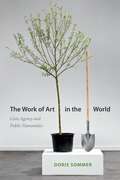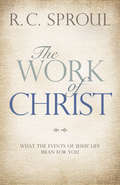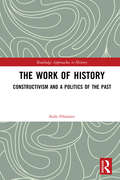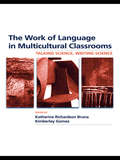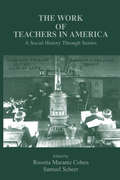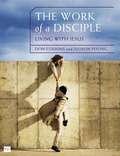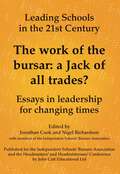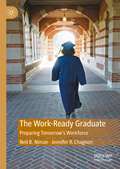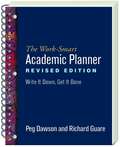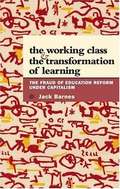- Table View
- List View
The Word Study That Sticks Companion: Classroom-Ready Tools for Teachers and Students, Grades K-6 (Corwin Literacy)
by Pamela A. KoutrakosFirst Pamela Koutrakos delivered a systematic approach to inquiry-based, student-centered, and joyful word study in her book Word Study That Sticks. Now, in The Word Study That Sticks Companion, Koutrakos offers tools and resources to help teachers put those structures, lessons, and routines into action. Loaded with teacher-facing resources such as planning and assessment tools, and student-facing tools such as reproducible minicharts, choice checklists, and self-assessments, The Word Study That Sticks Companion includes Ready-to-go materials that greatly minimize the time teachers spend preparing, creating, and revamping word study lessons More than 100 student-friendly, reproducible minicharts for student notebooks that summarize the routines in each area of word study and support robust word learning Twenty brand-new word study lessons to extend the learning throughout the year and across content areas Ideas for word study notebooks and choice charts that give students ownership of daily practice Suggestions for replicating many routines and tools in a digital format Customizable cycle schedules, checklists, look-fors, planning guides, record-keeping forms, and other tools that help teachers crystalize priorities, organize instruction, and adapt for all learners The routines and resources here can be used within any curriculum, as they transcend any one program, philosophy, or approach to word study. The Word Study That Sticks Companion enables consistent, authentic, and independent word study practice in K–6 classrooms. With these materials in hand, students can take charge of their learning, and teachers gain more time for differentiated instruction. Discover what’s possible when you ditch word study worksheets and workbooks once and for all!
The Word Study That Sticks Companion: Classroom-Ready Tools for Teachers and Students, Grades K-6 (Corwin Literacy)
by Pamela A. KoutrakosFirst Pamela Koutrakos delivered a systematic approach to inquiry-based, student-centered, and joyful word study in her book Word Study That Sticks. Now, in The Word Study That Sticks Companion, Koutrakos offers tools and resources to help teachers put those structures, lessons, and routines into action. Loaded with teacher-facing resources such as planning and assessment tools, and student-facing tools such as reproducible minicharts, choice checklists, and self-assessments, The Word Study That Sticks Companion includes Ready-to-go materials that greatly minimize the time teachers spend preparing, creating, and revamping word study lessons More than 100 student-friendly, reproducible minicharts for student notebooks that summarize the routines in each area of word study and support robust word learning Twenty brand-new word study lessons to extend the learning throughout the year and across content areas Ideas for word study notebooks and choice charts that give students ownership of daily practice Suggestions for replicating many routines and tools in a digital format Customizable cycle schedules, checklists, look-fors, planning guides, record-keeping forms, and other tools that help teachers crystalize priorities, organize instruction, and adapt for all learners The routines and resources here can be used within any curriculum, as they transcend any one program, philosophy, or approach to word study. The Word Study That Sticks Companion enables consistent, authentic, and independent word study practice in K–6 classrooms. With these materials in hand, students can take charge of their learning, and teachers gain more time for differentiated instruction. Discover what’s possible when you ditch word study worksheets and workbooks once and for all!
The Word of God for the People of God: An Entryway to the Theological Interpretation of Scripture
by J. Todd BillingsThis book fills a real need for pastors and students. Though there is currently a large body of material on the theological interpretation of Scripture, most of it is highly specific and extremely technical. J. Todd Billings here provides a straightforward entryway for students and pastors to understand why theological interpretation matters and how it can be done. / A solid, constructive theological work, The Word of God for the People of God presents a distinctive Trinitarian, participatory approach toward reading Scripture as the church. Billings's accessible yet substantial argument for a theological hermeneutic is rooted in a historic vision of the practice of scriptural interpretation even as it engages a wide range of contemporary issues and includes several exegetical examples that apply to concrete Christian ministry situations.
The Word of a Humble God: The Origins, Inspiration, and Interpretation of Scripture
by Karen R. Keen&“Scripture is a spring of life-giving, life-altering truth, but when we don&’t understand how and why it came to us, we end up misusing it.&” How did we get the Bible? And why does it matter? History reveals that Scripture can be used for both life-giving and destructive purposes. Discovering the Bible&’s origins makes all the difference for fostering redemptive interpretation of Scripture. Bringing together both historical criticism and theology, this investigation examines ancient scribal culture through the lens of faith. What we find is a divine-human collaboration that points to the character of God and the value of human agency. In this concise presentation of a breadth of scholarship usually only found across multiple volumes, Karen Keen offers a vital introduction to the material origins of the Bible, theories of inspiration, and the history of biblical interpretation—with reflections on what this all means for us as we read Scripture today. Through the ins and outs of these important topics, and with the aid of thought-provoking questions and learning activities at the end of each chapter, Keen argues that the Bible and its origins reveal a humble God who invites us to imitate that humility—a humility that is itself the most powerful antidote to the misinterpretation and abuse of Scripture.
The Word of the Cross: Reading Paul
by Jonathan A. LinebaughA collection of exegetical, historical, and theological essays on Paul&’s letters, including reception history and comparative readings in conversation with other texts.This collection of Jonathan Linebaugh&’s most important work on Paul explores the merciful surprise at the heart of Paul&’s gospel: a grace that, while strange and weak in worldly terms, is nothing less than the power of God, full of comfort and promise. Through twelve essays—two of them new—Linebaugh contextualizes and interprets key Pauline passages, does comparative readings of Paul in conversation with early Jewish texts, and enters into dialogue with Reformation theologians such as Martin Luther and Thomas Cranmer. Thorough and multifaceted, Linebaugh&’s work is at once exegetical, historical, and theological in scope. Accordingly, The Word of the Cross is a rigorous scholarly enterprise that takes seriously Paul&’s claim that the good news of Jesus Christ, despite appearing scandalous and foolish, in fact contradicts and overcomes the conditions of the possible through the power of God.
The Word: How We Translate the Bible—and Why It Matters
by John BartonFrom a distinguished Oxford scholar and the author of A History of the Bible, an examination of how biblical translation works and why it matters Throughout history, most Jewish and Christian believers have understood scripture not in the languages in which it was first written but rather in their own—in translation. In The Word, acclaimed Bible scholar John Barton explores how saints and scholars have negotiated the profound challenges of translating the Bible while remaining faithful to the original. In addition to considering questions of literal versus free translation, literary style, inclusive language, and more, Barton draws out scriptural translation&’s role at critical junctures in religious history. Far from a mere academic exercise, biblical translation has shaped how we answer faith&’s most enduring questions about the nature of God, the existence of the soul, and the possibility of salvation.
The Words We Live By
by Brian BurrellAt one time, this nation held a profound and simple faith in the power of words. Today we have become so engulfed in public cynicism that the whole notion of "words to live by" seems to us impossibly naive. Brian Burrell's splendid collection shows that many of the phrases we once lived by can still have resonance today. A comprehensive, fascinating treasure trove of American common sense and whimsy, The Words We Live By presents a sentimental rediscovery of a lost era in American history. From fraternal loyalty oaths to marriage vows, corporate mottoes to monument inscriptions, Ben Franklin to Henry Ford, Americans for generations have committed their most cherished ideals to print, often in charming and plain-spoken language that perfectly represents our provincial, pragmatic, and romantic national character. Burrell's work was inspired by his father, an obsessive collector of words and a chronic nostalgia buff who traveled widely with his family, introducing them to the landmarks, monuments, and other symbols of America's past. Throughout his life, he clipped or wrote down memorable phrases, quotes, mottoes, and quips, both the silly and the profound, the playful and the maudlin. Burrell has lovingly compiled his father's collection of scrapbooks, complementing them with extraordinary research into the origins of America's civic ethics, to produce a truly memorable and inspirational work of historical reference. More than just a compendium of classic American wit and wisdom, The Words We Live By brings this material to life with poignantly told stories, forgotten anecdotes, and deeply considered meditations on the meaning of the words that have shaped the American nation.
The Words and Works of Jesus Christ: A Study of the Life of Christ
by J. Dwight PentecostThe life of Jesus Christ takes on fresh clarity and meaning in this masterful work by Dwight Pentecost. The words, the miracles, and overarching message of the Messiah come alive in flowing and detailed chronology, set against the cultural, political, and religious setting of his day. You'll gain new understanding of why Jesus came, how he operated, and what he accomplished. Above all, you'll acquire a deeper appreciation for the love that guided his path, beginning in a manger in Bethlehem, leading through three and a half years of ministry that ended abruptly at the cross on Golgotha, and blazing forth in eternal triumph at the resurrection. Drawing liberally on the works of others who have written about Christ, such as Alfred Edersheim, J. W. Shepherd, W. Graham Scroggie, and Frederick Faraar, Dr. Pentecost reveals in his own writing a familiarity with the subject that comes from years of teaching. Yet he writes, not as one who knows all there is to know about Christ, but with the restraint of one who knows that Jesus is to be worshiped and adored as the great King, and that no book can do more than begin to tell all the wonders of his being and his love.
The Words of Jesus in the Gospel of Thomas: The Genesis of a Wisdom Tradition (Gnostica)
by David W. KimThis book offers a detailed analysis of the Gospel of Thomas in its historic and literary context, providing a new understanding of the genesis of the Jesus tradition. Discovered in the twentieth century, the non-canonical Gospel of Thomas is an important early text whose origins and place in the history of Christianity continue to be subjects of debate. Aiming to relocate the Thomasine community in the wider context of early Christianity, this study considers the Gospel of Thomas as a bridge between the oral and literary phases of the Christian movement. It will therefore, be useful for Religion scholars working on Biblical studies, Coptic codices, gnosticism and early Christianity.
The Work Situation of the Academic Profession in Europe: Findings of a Survey in Twelve Countries
by Ulrich Teichler Ester Ava HöhleThis book presents the analysis of the representative survey about the academic profession in twelve European countries. Higher education in Europe has experienced a substantial change in recent years: Expansion progresses further, the expectation to deliver useful contributions of knowledge to the "knowledge society" is on the rise, and efforts to steer academic work through external forces and strong international management are more widespread than ever. Representative surveys of the academic profession in twelve European countries show how professors and junior staff at universities and other institutions of higher education view the role of higher education in society and their professional situation and how they actually shape their professional tasks. Academics differ across Europe substantially in their employment and working conditions, their views and their activities. Most of them favour the preservation of a close link between teaching and research and feel responsible for both theory and practice. Most consider efforts to enhance academic quality and social relevance as compatible. The overall satisfaction with their professional situation is rather high.
The Work Smarter Guide to Sales: The 5-week Shortcut to Superb Sales Performance (Work Smarter Series)
by David Kean Maria Morozova-DuthoitSome people are born with a natural 'go-get-'em' approach. For most of us, however, selling does not come naturally. This book demystifies the art of getting people to buy - whether it is as simple as convincing your friends to agree to your restaurant recommendation, or as complex as getting people to buy your million- dollar proposal at work.The book is a toolkit for self-exploration, analysis, learning and action plan development framed in a 5-week programme for building your unique sales self. Setting a clear objective for every week, it takes the reader through a simple 5-step programme: - Setting the foundation: the main principles of sales- Rational aspects of sales - Emotional aspects of sales - Connecting the dots: closuring and continuation of the sales cycle - Creating your personalised action plan and toolbox with aide memoires, frameworks and life hacks to use every dayEach chapter concludes with a summary of do's and don'ts. The last chapter includes practical tools for analysing and planning your own self-development and business development. It will accelerate your understanding of and ability to sell by raising both your self-awareness and selling self-confidence.The 'Work Smarter' series:Our books provide shortcuts, tips and life-hacks for the development of essential business skills. The books bring together accomplished industry experts who have learned their trades at the coalface. They teach the skills ambitious businesspeople need in order to tip the playing field in their favour. It is the pirate equivalent of business advice; the antidote to conventional wisdom; 'smarter' practice over 'best practice'.
The Work Smarter Guide to Sales: The 5-week Shortcut to Superb Sales Performance (Work Smarter Series)
by David Kean Maria Morozova-DuthoitSome people are born with a natural 'go-get-'em' approach. For most of us, however, selling does not come naturally. This book demystifies the art of getting people to buy - whether it is as simple as convincing your friends to agree to your restaurant recommendation, or as complex as getting people to buy your million- dollar proposal at work.The book is a toolkit for self-exploration, analysis, learning and action plan development framed in a 5-week programme for building your unique sales self. Setting a clear objective for every week, it takes the reader through a simple 5-step programme: - Setting the foundation: the main principles of sales- Rational aspects of sales - Emotional aspects of sales - Connecting the dots: closuring and continuation of the sales cycle - Creating your personalised action plan and toolbox with aide memoires, frameworks and life hacks to use every dayEach chapter concludes with a summary of do's and don'ts. The last chapter includes practical tools for analysing and planning your own self-development and business development. It will accelerate your understanding of and ability to sell by raising both your self-awareness and selling self-confidence.The 'Work Smarter' series:Our books provide shortcuts, tips and life-hacks for the development of essential business skills. The books bring together accomplished industry experts who have learned their trades at the coalface. They teach the skills ambitious businesspeople need in order to tip the playing field in their favour. It is the pirate equivalent of business advice; the antidote to conventional wisdom; 'smarter' practice over 'best practice'.
The Work and Lives of Teachers
by Cohen Rosetta MarantzThe Work and Lives of Teachers offers a simple but original argument: that the cultural attitudes toward the teaching profession measurably influence how students perform. Cohen uses both ethnographic portraits and personal accounts from thirteen teachers - from Finland, Taiwan, Greece, Azerbaijan, France, Chile, South Africa, Siberia, Brazil, Romania, Philippines, Norway and the United States - to explore the meaning and value of teaching worldwide. This study includes the ways in which teachers in these countries are educated, recruited, compensated, and perceived by parents, students, administrators, and the culture at large. Teachers' voices, so rarely heard in international educational studies, are front and center here, highlighting the daily work in the classroom and the pleasures and struggles of engaging in the teaching profession in 2016. The lesson, briefly stated, is that societies are only as good as the people who teach in them.
The Work and Lives of Teachers in China (Routledge Research in Asian Education)
by Qing GuBy bringing together a distinguished group of scholars who have deep, extensive and complementary knowledge and expertise of the Chinese education system, The Work and Lives of Teachers in China engages in detailed discussions on contemporary issues about teachers and teaching in China. It locates teachers’ work and lives in a critical analysis of the political, socio-cultural, ideological and educational reform contexts, and through this, demonstrates how teachers in different professional life phases and in different schools are able to retain their vocational strength and commitment for learning and development. Using rich illustrations from real teachers in real primary and secondary schools, this book represents a collection of scholarly writings which build research and practice informed new knowledge about the nature of teachers’ work and lives in China. Through these comprehensive case studies, the book illustrates to policy makers, head teachers and training and development organisations the importance of sustaining teachers’ commitment and wellbeing in their efforts to improve quality and standards in today’s Chinese schools. The Work and Lives of Teachers in China provides valuable insight for policy makers, educators, researchers, teachers and students in education and beyond.
The Work of Art in the World: Civic Agency and Public Humanities
by Doris SommerCelebrating art and interpretation that take on social challenges, Doris Sommer steers the humanities back to engagement with the world. The reformist projects that focus her attention develop momentum and meaning as they circulate through society to inspire faith in the possible. Among the cases that she covers are top-down initiatives of political leaders, such as those launched by Antanas Mockus, former mayor of Bogotá, Colombia, and also bottom-up movements like the Theatre of the Oppressed created by the Brazilian director, writer, and educator Augusto Boal. Alleging that we are all cultural agents, Sommer also takes herself to task and creates Pre-Texts, an international arts-literacy project that translates high literary theory through popular creative practices. The Work of Art in the World is informed by many writers and theorists. Foremost among them is the eighteenth-century German poet and philosopher Friedrich Schiller, who remains an eloquent defender of art-making and humanistic interpretation in the construction of political freedom. Schiller's thinking runs throughout Sommer's modern-day call for citizens to collaborate in the endless co-creation of a more just and more beautiful world.
The Work of Christ
by R. C. Sproul"The work of Jesus reveals to us who He is. The work and the person may be distinguished but never separated."--Dr. R. C. Sproul Most Christians recognize the importance of Christ's death and resurrection. But how many of us understand the theological significance of Jesus' actions before and after the Crucifixion? In The Work of Christ, Dr. R. C. Sproul looks at every aspect of Jesus' life and work, addressing such life-changing topics as: Why Jesus' baptism is relevant for our salvation The similarities and differences between the temptation of the first Adam and the temptation of Jesus, the "second Adam" How God uses song to celebrate his redemptive acts Why the Last Supper marks the beginning of a greater exodus than that of the Old Testament How Jesus' death and resurrection are grounded in the eternal covenant among the persons of the Trinity Why Jesus' ascension makes a difference in our lives today What we know and don't know about Jesus' returnMoving from Jesus' existence from before creation through His incarnation, boyhood, adulthood, death, resurrection, and return, Dr. Sproul guides you to a deeper understanding of God's beautiful promise and purpose behind the works of Christ's life.
The Work of History: Constructivism and a Politics of the Past (Routledge Approaches to History #22)
by Kalle PihlainenSince the appearance of Hayden White’s seminal work Metahistory in 1973, constructivist thought has been a key force within theory of history and has at times even provided inspiration for historians more generally. Despite the radical theoretical shift marked by constructivism and elaborated in detail by its proponents, confusion regarding many of its practical and ethical consequences persists, however, and its position on truth and meaning is routinely misconstrued. To remedy this situation, The Work of History seeks to mediate between constructivist theory and history practitioners’ intuitions about the nature of their work, especially as these relate to the so-called fact–fiction debate and to the literary challenges involved in the production of historical accounts. In doing so, the book also offers much-needed insight into debates about our experiential relations with the past, the political use of history and the role of facts in the contestation of power.
The Work of Language in Multicultural Classrooms: Talking Science, Writing Science (Language, Culture, and Teaching Series)
by RoutledgeHow does language comprise the implicit or explicit curriculum of teaching and learning in multicultural science settings? Building on a growing interest in the ways in which language and literacy practices interact with science teaching and learning to facilitate or obstruct successful student outcomes, this book contributes to scholarship on the role of language in developing classroom scientific communities of practice, expands that work by highlighting the challenges faced specifically by ethnic- and linguistic-"minority" students and their teachers in joining those communities, and showcases exemplary teaching and research initiatives for helping to meet these challenges. Offering teacher practitioners and researchers in the fields of science education and multicultural education lenses through which they can critically consider the myriad of classroom settings, instructional approaches, curricular materials, and scientific topics involved in what it means to teach science while pointedly addressing concerns about equity of educational opportunity, this volume serves as a powerful resource for linking theory and practice. End-of-chapter reflection questions and engagement activities facilitate discussion round these issues and provide rich opportunities for the reader to consider the implications of each chapter for science instruction and research and to apply insights developed in a real-world science teaching and learning contexts.
The Work of Teachers in America: A Social History Through Stories
by Rosetta Marantz Cohen Samuel ScheerThis volume presents a complex portrait of the American teacher through a fascinating range of "story" narratives, including fictional short stories, poetry, diaries, letters, ethnographies, and autobiographies. Through these stories, the volume traces the evolution of the teacher and the profession over the course of two centuries -- from the late 1700s to the late 1900s. In depicting the profession over time, the authors include stories by and about both male and female teachers, as well as teachers from a wide range of cultural and ethnic backgrounds, including white, black, Hispanic, Asian-American, immigrant and native-born, and gay and straight. This book offers accessible, comprehensive introductions to both the central ideas associated with each period and to the representative individual stories that are included within it. The volume editors connect each of the parts to earlier and later ones by tracing evolving themes of feminization, teacher activism, conceptions of curriculum and discipline, and issues of multiculturalism. Questions, suggested readings, and activities are offered at the end of each section. Photographs and drawings -- retrieved from state historical archives -- provide telling images of the teacher in each of the four periods.
The Work of a Disciple: Living Like Jesus
by Judson Poling Don CousinsThe Walking with God series was developed as the curriculum for small groups at Willow Creek Community Church in South Barrington, Illinois. Since its release in 1992, it has been used by churches and small groups to help raise up devoted disciples of Christ. Group members who work through the program will lay a solid foundation for a lifelong walk with God.While small groups may be formed for a variety of purposes, the goal of this curriculum is for groups to produce disciples—fully devoted followers of Christ—by studying God’s Word in community. <P><P> To this end, the goal of the study is to produce disciples who walk with God, have a personal relationship with Jesus, and live in step with the Holy Spirit. It is also to produce believers who live the Word in all areas of life and contribute to the work that God is doing in the local church. Ultimately, the goal is to develop believers who impact the world and are prepared and eager to spread the good news of Christ to others.This material will help develop these attributes in group members. Each lesson includes group Bible study and discussion questions in addition to devotions, reflections, and personal study for use by individuals between the group sessions.
The Work of the Bursar: A Jack of All Trades?: Essays in Leadership for Changing Times
by Nigel Richardson Jonathan CookSeventeen writers provide a wealth of practical information and experience of the world of bursars. Topics include: bursars and Heads; the all-embracing nature of the job; the bursar and the bursarial team; introductory guide to child protection; policy statements and the rolling review; strategic planning, presenting accounts, finance and budgeting issues; building and maintenance; strategic planning and project management; clerk to the governors; legal issues; recruiting a bursar; the bursar in a boarding school; charities; managing ICT and its spending and getting the most out of the ISBA.
The Work of the Bursar: A Jack of All Trades?: Essays in Leadership for Changing Times
by Nigel Richardson Jonathan CookSeventeen writers provide a wealth of practical information and experience of the world of bursars. Topics include: bursars and Heads; the all-embracing nature of the job; the bursar and the bursarial team; introductory guide to child protection; policy statements and the rolling review; strategic planning, presenting accounts, finance and budgeting issues; building and maintenance; strategic planning and project management; clerk to the governors; legal issues; recruiting a bursar; the bursar in a boarding school; charities; managing ICT and its spending and getting the most out of the ISBA.
The Work-Ready Graduate: Preparing Tomorrow's Workforce
by Neil B. Niman Jennifer R. ChagnonThis book examines the tide of change facing higher education as it grapples with providing a more relevant and demonstrated value for its graduates entering the workplace. Based on their experience with the Business in Practice program they created, the authors share the rationale and practical approaches colleges and universities need to implement if they are to foster the development of a work-ready graduate. What sets the program apart are the two-credit courses crafted to take advantage of the unique knowledge and work experiences of industry professionals that complements our core curriculum. Utilizing experiential learning, the program is designed so that students can apply soft/smart skills in a progression that helps develop those capabilities that are beneficial for them and desired by employers. It is structured to bring internship-like experiences to campus, giving the vast majority of students a quality work-related experience that is impactful and relevant for today’s economy.
The Work-Smart Academic Planner (Revised Edition): Write It Down, Get It Done
by Peg Dawson Richard GuareFrom executive skills experts Peg Dawson and Richard Guare, the large-format academic planner that has helped thousands of students in grades 6?12 is now revised and updated. It provides an all-in-one resource for keeping track of assignments and due dates while developing the crucial executive skills needed to succeed in school and beyond. Students are given the tools to get organized, manage their time, learn study strategies, create daily/weekly study plans, and stay on track. They are also guided to evaluate their own executive skills in order to target their weaknesses and capitalize on strengths. In addition to simplified planner pages, the revised edition has an improved Studying for Tests form.
The Working Class and the Transformation of Learning: The Fraud of Education Reform Under Capitalism
by Jack Barnes"Schools under capitalism are not institutions of learning but of social control, aimed at reproducing the class relations and privileges of the prevailing order," Jack Barnes explains. "Until society is reorganized so that education is a human activity from the time we are very young until the time we die, there will be no education worthy of working, creating humanity. That is the historical truth".
